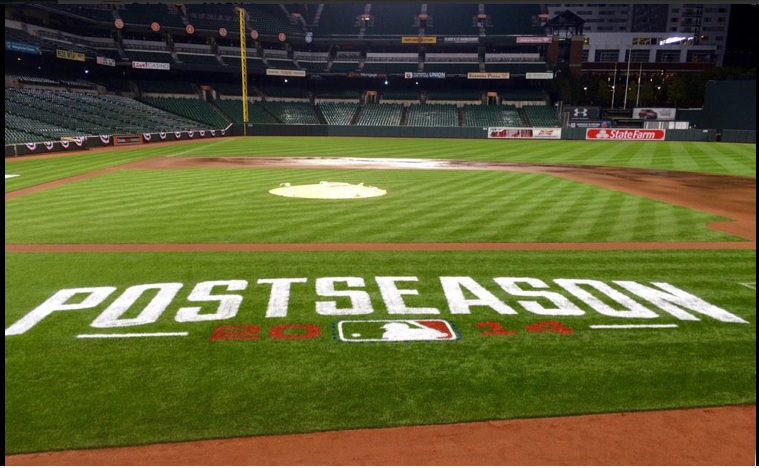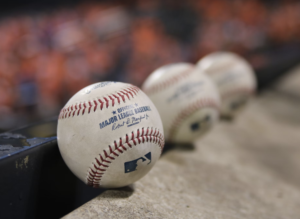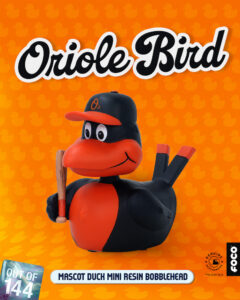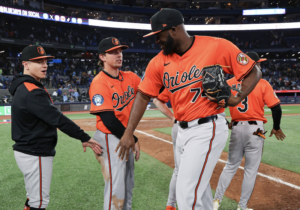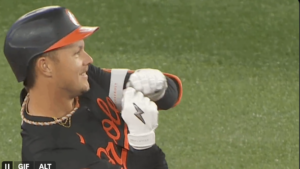I don’t want to watch the World Series. I have no rooting interest. I’m still getting over my depression about the Orioles’ exit, and while I comfort myself with the knowledge of all the Orioles accomplished this year (96 wins, AL East title, beating out the Detroit Tigers for a trip to the ALCS), I’m still left wanting more. Yet despite all these feelings, I still find myself watching the World Series. It’s like watching the last season of Lost. No one enjoyed the last season of Lost or really even wanted to watch it, but at that point you invested so much time and mental thought into the show that you had to see it through. Likewise, I reluctantly and disinterestedly watch the World Series.
Therefore, in an effort to make my watching of the World Series a bit more bearable I decided to come up with a few things that the Baltimore Orioles can learn from Kansas City Royals’ improbable run to the World Series, in an effort that this whole World Series thing may have some benefit after all.
1. Know Thyself.
“As an organization, one of the most important things you can do is know who you are, and who you’re not. When I first came here, we talked about that a lot: ‘Who are we and how are we going to do this?’”
-Buck Showalter
Much was made before the ALCS about the Orioles being ranked first in home runs and last in stolen bases while the Royals were first in stolen bases and last in homer uns. Not only is this a fascinating stat, but also it proves one of the most basic principles about baseball that many people don’t want to admit: there is more than one way to build a championship team. Baseball is about scoring runs and preventing your opponent from scoring runs; it doesn’t matter if you accomplish this via walks, home runs, steals or bunt singles. The end goal is the same; the method is subject to change.
For example, this offseason many people will discuss how the Orioles need to improve their on base percentage. A similar conversation took place last year after the Orioles failed to make the playoffs. In 2013 with the Orioles only attaining an OBP of .313 and stealing just 79 bases many people thought these weaknesses needed to be addressed if the Orioles were to make the playoffs. Welp, in 2014 the Orioles OBP dropped to .311 and they only stole 44 bases… and they won the AL East. Of course there were many reasons why they made the playoffs, but the point is there is no singular formula for building a winning team. However, it is important to understand who you are as a baseball team, so you can maximize your strengths and minimize your weaknesses.
2. Great Bullpens are Necessary
“After the sixth inning, my thinking’s done.”
-Ned Yost
By game three of the ALCS everyone knew it. The Orioles needed to score runs in the first six innings because after the sixth comes Kelvin Herrera, Wade Davis and Greg Holland and opponents are either unable or legally not allowed (still not clear which one it is) to score runs when these pitchers are in the game. Now if everyone at home watching knows that the Orioles need to score runs before the seventh, it’s undoubtedly true that Oriole batters are thinking the same thing. Thus batters press in the early innings and if they’re not scoring early, they’re not scoring at all.
There are very few dominant starting pitchers in baseball; however, there are many starters who can be really good for five or six innings and if you have a shutdown bullpen, then you can still win without elite starters. The Royals are a perfect example of this. Looking at the pitchers rankings by ERA during the regular season, one has to go all the way down to number 27 to find the first Royals pitcher. Despite this lack of a top ranked pitcher, the Royals pitching staff is one of the last pitching staffs that any team would want to face. Let some other team overpay and sign Max Scherzer or Jon Lester for a 200 million dollars; I’ll take a bunch a pretty good pitchers and an elite bullpen over an ‘ace’.
3. Consistently Good Beats Occasionally Great
“I ‘ve been around teams that’ve won a hundred games and you walk up the runway wondering how you’re ever gonna win another game. And there are times I’ve been on teams who’ve had their struggles and you feel like your never gonna lose another game.”
-Buck Showalter
The Kansas City Royals won only 89 games this year while their opponent in the World Series, the San Francisco Giants, won just 88 games. When the Orioles and Royals faced off in the ALCS it did not matter that the Orioles won six more regular season games than the Royals; nor did it matter that in the regular season the Orioles had scored more runs and given up fewer runs than the Royals. In short, it didn’t matter that for six months the Baltimore Orioles were a better baseball team than the Kansas City Royals. The only thing that matters is, for a week in mid-October the Royals were better.
The Oakland Athletics went “all in” to win this year, giving up a lot of young talent to trade for Jeff Samardzija, Jason Hammel and then most significantly Jon Lester. The result? They were bounced out of the playoffs after one game. What lesson can one learn from this? Going “all in” doesn’t make sense because the best team or the best players don’t necessarily play the best in any given series.
The Orioles organization over the next couple years would do well to remember the lesson of the Royals – you don’t need to be the best team during the regular season; along with the lesson of the Athletics, going “all in” is risky business. There is a tendency to think that the Orioles have a one or two year window to win so they should go “all in” to win the World Series in the next couple years. This would be a mistake. The Orioles should attempt to not go “all in” and be great for one or even two years, but they should attempt to be consistently good over an extended period of time. The Orioles should aim to win 90 games every single year and therefore give themselves a chance to make the playoffs and get hot at the right time to make a run in the playoffs. The Orioles would have a better chance at a World Series if they go in as a Wild Card four out of the next five years as opposed to if they just went in as the AL East champs one year. Dan Duquette and Buck Showalter should make decisions that will make the Orioles consistently good for as long as possible.
If the Orioles follow these three lessons: 1. Know They Self 2. Great Bullpens are Necessary 3. Consistently Good Beats Occasionally Great, then not only will the Orioles put themselves in position for another World Series run, but also this whole World Series thing this year may not have been a complete waste.

